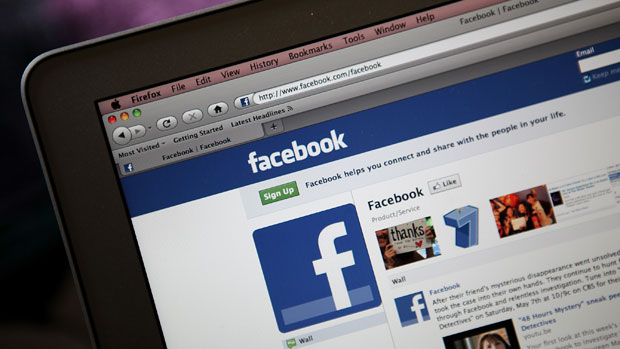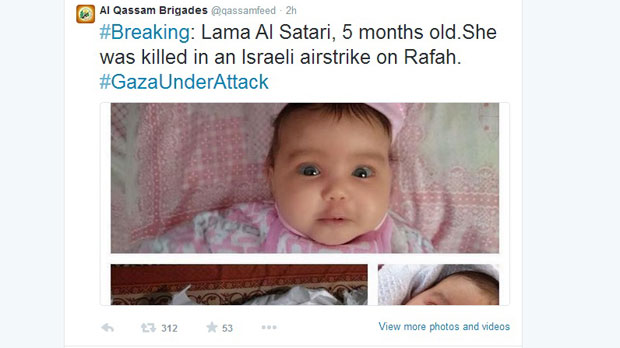Gaza conflict: the social media front line
Israelis and Palestinians wage an online war of information, but is it just a 'minefield of propaganda'?

A free daily email with the biggest news stories of the day – and the best features from TheWeek.com
You are now subscribed
Your newsletter sign-up was successful
As the Israeli-Palestinian conflict accelerates in Gaza, another war is being waged by both sides on social media.
Since Israel launched Operation Protective Edge an "intense social media battle" has raged, the BBC reports. Hamas and the Israeli Defence Force (IDF) have become increasingly active across all major social media platforms including Facebook, Twitter, YouTube, Instagram and Flickr as they seek to rally support.
Israel's social media campaign:
The Week
Escape your echo chamber. Get the facts behind the news, plus analysis from multiple perspectives.

Sign up for The Week's Free Newsletters
From our morning news briefing to a weekly Good News Newsletter, get the best of The Week delivered directly to your inbox.
From our morning news briefing to a weekly Good News Newsletter, get the best of The Week delivered directly to your inbox.
Hamas terrorists operate from schools, mosques & hospitals pic.twitter.com/WQNkFLxrSm— IDF (@IDFSpokesperson) July 17, 2014
The IDF's official Twitter account provides live updates on rocket launches, Israeli casualties and its various offensives. The Israeli government has also recruited hundreds of students to take part in its 'hasbara', or public diplomacy campaign, the Guardian reports. "We counter Palestinian propaganda and explain the Israeli perspective," student campaigner Ben-Yosef said. "Social media is another place where the war goes on. This is another way to tell our story."
Earlier this week, the Israeli Prime Minister's was caught buying tweets to increase support for its military operation in Gaza, Al Jazeera reports.
The Palestinian campaign:

There has been a surge in activity on the Twitter account of al-Qassam, Hamas's military wing. The group tries to maximise its reach by posting in English, Arabic and Hebrew. It has been criticised for posting extremely graphic and distressing images of dead or injured children.
A free daily email with the biggest news stories of the day – and the best features from TheWeek.com
The group's English language account was suspended today. Twitter refused to comment for "privacy and security reasons" but speculation on social media suggests it contravened Twitter's code of conduct by posting graphic pictures.
Numerous hashtags such as #GazaUnderAttack, #StopIsrael and #PrayForGaza were set up to highlight attacks on Palestinian civilians. Hamas also published this YouTube video with instructions on posting to social media.
Palestinian activists who are not connected to Hamas are also playing an important part in this social media war, Al Jazeera reports. "Social media started revolutions," Mahmoud Hrebat, a young Palestinian activist said. "It is a tool not to be underestimated."
The benefits of the social media campaigns
Social media accounts give both sides the chance to tell their side of the story, and many were set up amid accusations that the mainstream media failed to represent their point of view.
Nevertheless, the most "strategically important" section of the audience that each side hopes to reach includes "the journalists who follow their accounts, Philip Howard, professor of communication at Washington University, told the BBC. "They know that a well-placed tweet can help spin news coverage."
And the disadvantages
Churchill's claim that "a lie gets halfway around the world before the truth has got its boots on" has rarely been more apt. The social media war has become "a minefield of propaganda and misinformation", reports the Independent, and each side accuses the other of spreading deceptive statistics and propaganda. Images posted online are often difficult to verify and misleading pictures from previous conflicts are often widely circulated.
-
 Crisis in Cuba: a ‘golden opportunity’ for Washington?
Crisis in Cuba: a ‘golden opportunity’ for Washington?Talking Point The Trump administration is applying the pressure, and with Latin America swinging to the right, Havana is becoming more ‘politically isolated’
-
 5 thoroughly redacted cartoons about Pam Bondi protecting predators
5 thoroughly redacted cartoons about Pam Bondi protecting predatorsCartoons Artists take on the real victim, types of protection, and more
-
 Palestine Action and the trouble with defining terrorism
Palestine Action and the trouble with defining terrorismIn the Spotlight The issues with proscribing the group ‘became apparent as soon as the police began putting it into practice’
-
 Epstein files topple law CEO, roil UK government
Epstein files topple law CEO, roil UK governmentSpeed Read Peter Mandelson, Britain’s former ambassador to the US, is caught up in the scandal
-
 Iran and US prepare to meet after skirmishes
Iran and US prepare to meet after skirmishesSpeed Read The incident comes amid heightened tensions in the Middle East
-
 Israel retrieves final hostage’s body from Gaza
Israel retrieves final hostage’s body from GazaSpeed Read The 24-year-old police officer was killed during the initial Hamas attack
-
 China’s Xi targets top general in growing purge
China’s Xi targets top general in growing purgeSpeed Read Zhang Youxia is being investigated over ‘grave violations’ of the law
-
 Panama and Canada are negotiating over a crucial copper mine
Panama and Canada are negotiating over a crucial copper mineIn the Spotlight Panama is set to make a final decision on the mine this summer
-
 Why Greenland’s natural resources are nearly impossible to mine
Why Greenland’s natural resources are nearly impossible to mineThe Explainer The country’s natural landscape makes the task extremely difficult
-
 Iran cuts internet as protests escalate
Iran cuts internet as protests escalateSpeed Reada Government buildings across the country have been set on fire
-
 US nabs ‘shadow’ tanker claimed by Russia
US nabs ‘shadow’ tanker claimed by RussiaSpeed Read The ship was one of two vessels seized by the US military